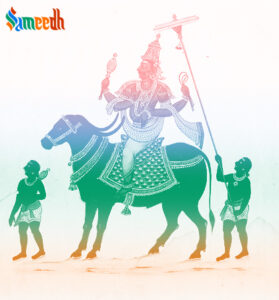Yam is a Hindu deity who is revered as the god of death in Hinduism. In Hindu mythology, Yama is depicted as a powerful and fearsome deity who is responsible for overseeing the passage of souls from the world of the living to the world of the dead.

Yam is a Hindu deity who is revered as the god of death in Hinduism. He was the first mortal to die and so, was made the God of death. In Hindu mythology, Yam is depicted as a powerful and fearsome deity who is responsible for overseeing the passage of souls from the world of the living to the world of the dead.
Yam is usually depicted in Hindu art and literature as a man with dark skin and a crown of skulls, holding a noose in his hand. He is often shown riding on a buffalo or a black mule, and is accompanied by his sister, the goddess of the dawn, and his two dogs, which are said to represent the sun and the moon.
In Hindu mythology, Yam is the son of the sun god, Surya, and the twin brother of the Yami, who became the river Yamuna.
Yam is an important figure in Hinduism and is revered as a deity of death and the afterlife. He is often invoked in Hindu rituals and ceremonies, and is seen as a protector of the people. Yam is also considered to be an avatar, or incarnate manifestation, of Shiv and is revered as a manifestation of Shiv’s divine power and strength.
The main temple dedicated to Yam is the Yam Temple in the state of Gujarat, India, which is an important place of pilgrimage for Yam devotees. The temple is known for its beautiful and ornate architecture, and is an important cultural and religious site in Gujarat.
Discourse with Yuddhishthir
The discourse between Yam, the Hindu god of death, and Yudhishthir, a prince and hero in Hindu mythology, is a famous story from the Mahabharat, an ancient Indian epic.
According to the story, Yudhishthir was the son of Pandu, the king of Hastinapura, and was known for his righteousness and wisdom. One day, Yudhishthir was approached by Yam, who had come to claim his soul as he was due to die.
Yudhishthir, who was unwilling to leave the world of the living, asked Yam to give him time to bid farewell to his loved ones and to make arrangements for his kingdom. Yam agreed, and the two engaged in a discourse on the nature of death and the afterlife.
During the discourse, Yudhishthir asked Yam a series of questions about the nature of death, the souls of the deceased, and the nature of the afterlife. Yam answered each of Yudhishthir’s questions, imparting his knowledge and wisdom on these subjects.
The discourse between Yama and Yudhishthira is an important and well-known story from the Mahabharat, and is seen as a representation of the eternal struggle between life and death. The story is often cited as an example of the importance of wisdom and understanding in the face of death, and is revered as a source of spiritual inspiration in Hinduism.
Rakshabandhan and Yam
Raksha Bandhan, also known as Rakhi, is a Hindu festival that celebrates the bond of love and affection between brothers and sisters. The festival is traditionally observed by Hindus in India, Nepal, and other parts of South Asia, and is an important cultural and religious event in these regions. According to Hindu mythology, Raksha Bandhan is associated with Yama, the Hindu god of death, and his sister, the goddess of the dawn. It is said that Yama once saved his sister from a demon, and to show her gratitude, she tied a sacred thread around his wrist to protect him from harm. On Raksha Bandhan, sisters tie a sacred thread, or rakhi, around the wrists of their brothers, symbolizing the bond of love and protection between them. The brothers, in turn, pledge to protect and care for their sisters and to always stand by them in times of need.
Raksha Bandhan is a celebration of the bond of love and affection between brothers and sisters, and is an important cultural and religious event in Hinduism.
Role of Death
In Hinduism, death is seen as a natural and inevitable part of the cycle of life. Hindus believe that the soul is eternal and that it passes through a cycle of birth, death, and rebirth, known as samsar. Hindus also believe that the soul’s ultimate goal is to achieve liberation, or moksha, from the cycle of samsara and to unite with the divine.
Death is seen as an opportunity for the soul to leave the physical body and to begin its journey towards its next incarnation. Hindus believe that the soul’s next incarnation is determined by its karm, or the accumulated good and bad deeds that it has performed in its previous lives.
In Hinduism, death is also seen as a time of great spiritual importance, and Hindus often observe a number of rituals and ceremonies to mark the passing of a loved one. These rituals are intended to help the soul of the deceased to make a peaceful transition from the world of the living to the world of the dead, and to provide comfort and support to the family and loved ones of the deceased.
Hindus also believe in the concept of reincarnation, and that the soul is reborn into a new physical body after death. Hindus believe that the soul’s next incarnation is determined by its karm, and that it can be reborn as a human, animal, or any other being depending on its actions in its previous life. Yam is essential in facilitating this journey.